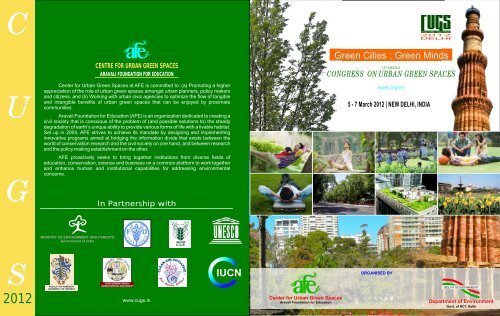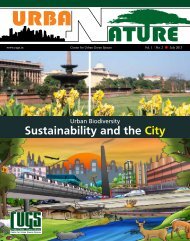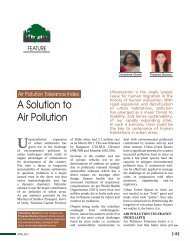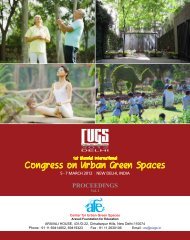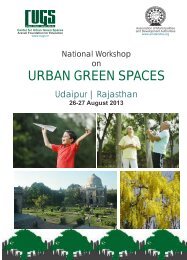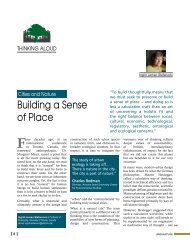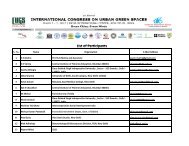urban green space 6-5-11 - Center for Urban Green Spaces
urban green space 6-5-11 - Center for Urban Green Spaces
urban green space 6-5-11 - Center for Urban Green Spaces
You also want an ePaper? Increase the reach of your titles
YUMPU automatically turns print PDFs into web optimized ePapers that Google loves.
C<br />
DELHI<br />
U<br />
G<br />
CENTRE FOR URBAN GREEN SPACES<br />
ARAVALI FOUNDATION FOR EDUCATION<br />
<strong>Center</strong> <strong>for</strong> <strong>Urban</strong> <strong>Green</strong> <strong>Spaces</strong> at AFE is committed to: (a) Promoting a higher<br />
appreciation of the role of <strong>urban</strong> <strong>green</strong> <strong>space</strong>s amongst <strong>urban</strong> planners, policy makers<br />
and citizens, and (b) Working with <strong>urban</strong> civic agencies to optimize the flow of tangible<br />
and intangible benefits of <strong>urban</strong> <strong>green</strong> <strong>space</strong>s that can be enjoyed by proximate<br />
communities.<br />
Aravali Foundation <strong>for</strong> Education (AFE) is an organization dedicated to creating a<br />
civil society that is conscious of the problem of (and possible solutions to) the steady<br />
degradation of earth’s unique ability to provide various <strong>for</strong>ms of life with a livable habitat.<br />
Set up in 2004, AFE strives to achieve its mandate by designing and implementing<br />
innovative programs aimed at bridging the in<strong>for</strong>mation divide that exists between the<br />
world of conservation research and the civil society on one hand, and between research<br />
and the policy making establishment on the other.<br />
AFE proactively seeks to bring together institutions from diverse fields of<br />
education, conservation, science and business on a common plat<strong>for</strong>m to work together<br />
and enhance human and institutional capabilities <strong>for</strong> addressing environmental<br />
concerns.<br />
In Partnership with<br />
<strong>Green</strong> Cities : <strong>Green</strong> Minds<br />
1ST BIENNIAL<br />
CONGRESS ON URBAN GREEN SPACES<br />
www.cugs.in<br />
5 - 7 March 2012 | NEW DELHI, INDIA<br />
MINISTRY OF ENVIRONMENT AND FORESTS<br />
Government of India<br />
S<br />
2012<br />
FACULTY OF FORESTRY<br />
UNIVERSITY OF TORONTO<br />
www.cugs.in<br />
IUCN<br />
<strong>Center</strong> <strong>for</strong> <strong>Urban</strong> <strong>Green</strong> <strong>Spaces</strong><br />
Aravali Foundation <strong>for</strong> Education<br />
ORGANISED BY<br />
DELHI GOVERNMENT<br />
Department of Environment<br />
Govt. of NCT, Delhi
Creation and management of <strong>green</strong> <strong>space</strong>s<br />
(including <strong>urban</strong> <strong>for</strong>ests) has been gaining<br />
importance as <strong>urban</strong>ization becomes the<br />
most significant reason <strong>for</strong> human migration in the<br />
world. <strong>Urban</strong> <strong>Green</strong> <strong>Spaces</strong> provide town and city<br />
dwellers with significant environmental,<br />
recreational and material benefits. They are also<br />
home to a vast diversity of flora and fauna and are<br />
recognized as important repositories of<br />
biodiversity.<br />
This is particularly true <strong>for</strong> developing<br />
countries where <strong>urban</strong>ization is progressing at an<br />
unprecedentedly rapid rate and a demographic<br />
switch from a predominantly rural to a<br />
predominantly <strong>urban</strong> society is taking place. UN<br />
(1991) figures indicate that in 1990 only 37% of<br />
the total population of developing countries was<br />
living in <strong>urban</strong>ized area. It is predicted that by the<br />
year 2025 the proportion will be 61%. Already<br />
rapid and uncontrolled <strong>urban</strong>ization in many<br />
developing countries is having fundamental social<br />
and environmental consequences. The role of<br />
<strong>Urban</strong> <strong>Green</strong> <strong>Spaces</strong> in ameliorating this situation<br />
is critical and significant and needs to be<br />
recognized in planning, creation and<br />
management of rapidly expanding <strong>urban</strong> human<br />
settlements.<br />
From every angle - demographic,<br />
environmental or social - cities in the Indian<br />
subcontinent are far more significant today than<br />
they were a just a few decades ago. In India alone,<br />
they are home to an estimated 340 million people,<br />
or 30% of total population. By 2030, existing and<br />
new Indian cities are expected to provide shelter<br />
to 590 million people, or 40% of the population. It<br />
is a fact that <strong>urban</strong>ization in Indian sub-continent<br />
is well underway, and will continue unabated.<br />
There is an urgent need to engage with this reality<br />
of an <strong>Urban</strong> future and look <strong>for</strong> answers to<br />
questions about longterm sustainability and<br />
environmental robustness of our cities.<br />
CUGS2012 will take a critical look at the<br />
interface between <strong>urban</strong> human habitations and<br />
<strong>urban</strong> <strong>green</strong> <strong>space</strong>s to enrich our understanding<br />
of their interconnectedness with quality of life in<br />
our fast expanding cities. The Congress will deal<br />
with physical, spatial, economic, environmental,<br />
aesthetic, and other dimensions of <strong>urban</strong> <strong>green</strong><br />
<strong>space</strong>s.<br />
The above subjects would be captured<br />
under the following sub-themes:<br />
<strong>Urban</strong> <strong>Green</strong> <strong>Spaces</strong> : Climate Change Mitigation and Energy Use Optimisation<br />
<strong>Urban</strong> <strong>Green</strong> <strong>Spaces</strong> : Biodiversity, Livelihoods, Economics and Valuation<br />
<strong>Urban</strong> <strong>Green</strong> <strong>Spaces</strong> : Water Conservation and Pollution Control<br />
CONGRESS<br />
ON<br />
URBAN<br />
GREEN<br />
SPACES<br />
CUGS2012 - OBJECTIVES<br />
To review the status, and prospects, of <strong>Urban</strong> <strong>Green</strong> <strong>Spaces</strong>, with specific reference to the Indian subcontinent.<br />
To understand and analyse best practices in planning, establishment and management of <strong>Urban</strong> <strong>Green</strong> <strong>Spaces</strong>.<br />
To examine and analyse successful <strong>Urban</strong> <strong>Green</strong> Space initiatives from across the world.<br />
To facilitate exchange of in<strong>for</strong>mation & ideas and promote cross sectoral learning.<br />
To foster peer review, and networking, among stakeholders to promote concomitant action on pertinent issues.<br />
PARTICIPATION PROFILE<br />
<strong>Green</strong> Cities : <strong>Green</strong> Minds<br />
www.cugs.in<br />
<strong>Urban</strong> Planners and City Managers, policy makers at various levels, <strong>urban</strong> <strong>for</strong>esters, floriculture and<br />
horticulture experts, academicians and educationists, RWA representatives, CSR Heads and civil society<br />
institutions interested in various dimensions of <strong>Urban</strong> <strong>Green</strong> <strong>Spaces</strong>. These will include, but will not be restricted to,<br />
participants from UN Agencies, government departments and agencies, local authorities and municipalities,<br />
universities and research centers, private sector companies engaged in <strong>urban</strong> development and civic<br />
management businesses, and bilateral/multilateral developmental agencies, media professionals and students.<br />
C<br />
U<br />
G<br />
Register Now!<br />
Registration is required <strong>for</strong><br />
confirming one's participation in<br />
CUGS2012<br />
10% concession <strong>for</strong> those who<br />
register be<strong>for</strong>e January 31, 2012<br />
For more details about registration process and charges<br />
please visit : www.cugs.in/registration.html<br />
<strong>Urban</strong> <strong>Green</strong> <strong>Spaces</strong> : Civil Society Engagement and Educational Linkages<br />
<strong>Urban</strong> <strong>Green</strong> <strong>Spaces</strong> : Management Practices and Technology<br />
<strong>Urban</strong> <strong>Green</strong> <strong>Spaces</strong> : Policy, Planning, Finance and Governance<br />
Please note that the papers may cut<br />
across more than one of the six sub-themes.<br />
For more in<strong>for</strong>mation on the sub-themes visit the<br />
Congress website: www.cugs.in<br />
Abstracts Invited<br />
Abstracts are invited <strong>for</strong> Oral and Poster<br />
presentations on topics relevant to any one or<br />
more of CUGS sub-themes.<br />
Travel grants and registration fee waiver will<br />
be available <strong>for</strong> a limited number of Indian<br />
participants.<br />
For more details regarding submission of abstracts and<br />
cut-off dates please visit : www.cugs.in/abstracts.html<br />
CUGS2012 Exhibition<br />
Showcase your ef<strong>for</strong>ts and/or target your<br />
products and services to highly focused and<br />
relevant target audience.<br />
Limited number of exhibition stalls available<br />
strictly on first come first service basis.<br />
For more details regarding CUGS2012 Exhibition<br />
please visit : www.cugs.in/exhibition.html<br />
S<br />
2012<br />
www.cugs.in


